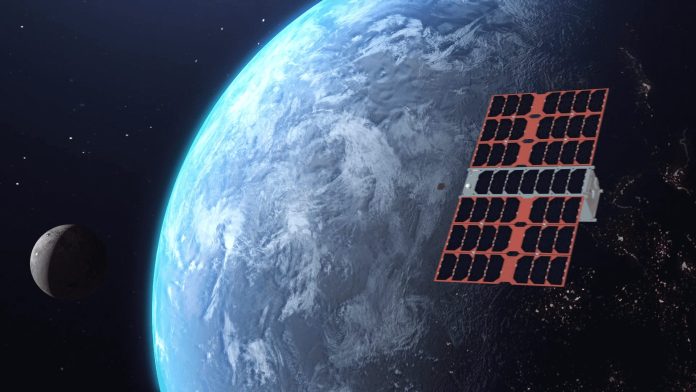Consolidation in the satellite IoT space, already, and again; Swiss satellite IoT operator Astrocast has agreed a deal to acquire busy Dutch industrial IoT scale-up Hiber. Astrocast, with a network of 12 nanosatellites as it stands, has a stated plan to have 20 in orbit by the end of 2022, 40 by the end of 2023, and 100 by 2025. It expects the deal for Hiber to close “immediately” following a public offering on Euronext Growth Paris later this year.
Astrocast, founded in 2014, has L-band spectrum at 1-2 GHz, at the top end of the ultrahigh frequency (UHF) range, via a relationship with UAE-based mobile-satellite service provider Thuraya. It serves the agriculture, maritime, and utilities markets, as well as providing connectivity for environmental monitoring. Hiber, founded in 2016, makes IoT solutions for remote industry, combining sensors, analytics, and satellite connectivity.
Astrocast makes its products in-house, from the satellites to the terminals; its headline ultra-low power Astronode S module was developed in combination with Airbus, CEA/LETI, and ESA. It said the deal for Hiber, which secured €26 million in EU and private investment in 2021, and announced at the end of 2021 it will use Inmarsat’s ELERA satellite IoT network to expand its own Hiberband-branded low-power IoT network, will accelerate its in-house OEM strategy.
Astrocast has agreed to acquire all of Hiber’s shares in exchange for the issuance of new Astrocast shares, representing 16.5 percent of Astrocast’s share capital, calculated prior to its public offering on Euronext Growth Paris. Hiber’s shareholders also agreed to invest €10.45 million in Astrocast’s public offering. Astrocast expects to have raised €60-€80 million, already, with an initial offering on Euronext Growth Oslo earlier this year.
Astrocast wants to use the new funding round to complete the deployment of its satellite IoT network, and to “ramp-up” commercial activities. Future constellation launches and upgrades are targeted to be funded from cash flow from operations and debt, it said. Its existing constellation includes 12 satellites, 10 of which provide commercial IoT services on an international scale, it claims. When the network reaches 20-30 in satellites, it will offer latency of less than 15 minutes – “which satisfies most IoT use cases,” it said.
It is negotiating an extension on its L-band spectrum agreement, it said, to “significantly de-risk” its business plan. Prospective customers are receiving development kits to test various IoT applications. The company has a partnership agreement with Telefonica, among others, with the “potential to connect thousands of maritime shipping containers… through the Astrocast network”.
Hiber provides satellite-connected IoT modules for industrial asset monitoring and tracking. Its fledgling Hiberband network was developed initially under its own steam, including via its €26 million EU investment, in combination with the Dutch government, as a part of its €278 million European Innovation Council (EIC) Fund. Its HiberEasypulse system claims to offer cheap IoT connectivity for tracking and monitoring in remote locations.
Its HiberHeavy solution, released in March, is geared for monitoring heavy equipment, also in remote locations, where mobile coverage fails. Both are targeted at the oil and gas, forestry, mining, and military sectors, among others. Royal Dutch Shell announced in September it is using the HiberHilo solution to monitor the condition of offshore oil wells. The solution has been installed at Shell operations in the North Sea.
It has a joint venture around the HiberHilo product with solution provider WTS Energy, which sells digital change solutions to the oil and gas sector; WTS Energy claims 1,250 consultants in 18 countries.
Fabien Jordan, chief executive at Astrocast, said: “Hiber is recognised as a powerful IoT scale-up within the market. [Its] focus on satellite-enabled IoT solutions, innovation and production aligns with Astrocast’s strategic go-to-market priorities for 2022 and beyond… Astrocast will gain access to customer segments that we have historically had little traction with. These segments complement Astrocast’s current sales effort. In addition, this acquisition will strengthen financing opportunities for Astrocast, benefiting investors, and accelerating the total fundraising plan for Astrocast.”
Roel Jansen, chief executive at Hiber, said: “Hiber brings IoT solutions to its customers located in the most remote locations on earth; we are democratizing data for industries that previously did not have access to affordable and easy-to-use solutions via satellites. We are excited to join forces with Astrocast to continue developing and providing world-class IoT solutions that are unrivalled in service excellence and product innovation within the IoT space.”

